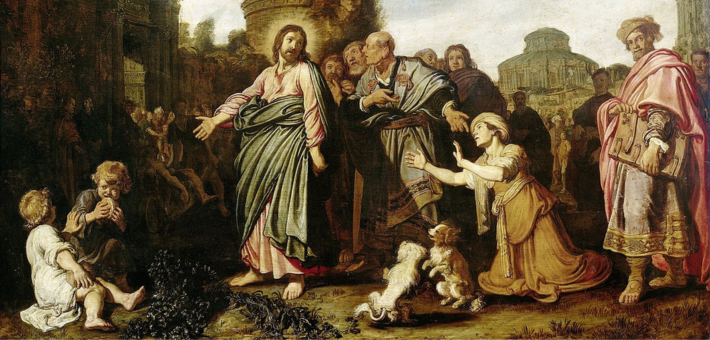Commentary on Proverbs 22:1-2, 8-9, 22-23
This pieced-together pericope from Proverbs offers the reader a clear message for those functioning in capitalist markets in any time and place: material wealth is not the key to a wise and fulfilled life.
The “book” of Proverbs is more correctly identified as an anthology or, rather, an anthology of anthologies. It contains several collections of sayings and instructions. The date and provenance of these collections are wide-ranging, and their influences include ancient material from Egypt, Persia, and Mesopotamia. Despite its amalgamated construction, Proverbs offers us a relatively straightforward ethical standard, one that
- promotes the welfare of the poor over and against the benefits of the rich,
- seeks to elevate the household as a paragon for society, and
- is ordained by God, who has created the world and all things in it.
The current pericope (22:1–2, 8–9, 22–23) is a micro-amalgamation, being a small selection of nonconsecutive verses. In fact, scholarship generally marks chapter 22 as a split between two larger collections in Proverbs. The first 16 verses of chapter 22 make up the end of a large collection known as the “Proverbs of Solomon” (10:1–22:16). Proverbs 22:17 begins a new collection: the “Words of the Wise.” This latter collection extends to 24:22.
Delineating these collections is important, as they likely have different provenances. The collection attributed to Solomon (10:1–22:16) most likely contains the oldest proverbs and sayings in the whole book—some dating perhaps to the 10th century BCE1—making it a core around which the other collections are assembled. It can be further divided into two sections. The first (10:1–15:33) has a high density of antithetical (contrastive) statements and focuses on the question of the benefits of a life guided by wisdom. By contrast, the second section (16:1–22:16) contains reiterative and synthetic or complementary statements. Though still reviewing the benefits of wisdom, it covers a larger variety of topics, including many statements about kingship and court life.
The third collection, the “Words of the Wise” begins at 22:17. This section likely dates to the 8th–7th centuries BCE and bears a strong connection to the Egyptian Instruction of Amenemope (13th century BCE, 19th Dynasty), an instruction of 30 sayings for young men who would become bureaucrats.
Although encompassing two larger collections, the verses selected from chapter 22 all relate to matters of wealth and poverty. What’s more, this pericope speaks quite directly to those in positions of power and privilege. In its historical context, these verses were likely meant to be instruction for young people about to enter into public (prominent) society. For readers in all times and spaces, the proverbs remind us that God is and always has been on the side of the poor and disenfranchised; if we are to live wisely (in other words, according to God’s will), we should be too.2
The rest of this commentary will provide a closer look at the proverbial sayings in this pericope:
Verse 1—The free agency of the individual is notable here; the establishing of one’s reputation (Hebrew shem, “name”) is something that a person prioritizes in life over the accumulation of wealth.
Verse 2—The relatively lower value placed on wealth (as compared to reputation or regard) in verse 1 leads to the proverb here. Through the use of a perfect verb, the Hebrew imagines a meeting or coming together of two people, one rich and the other poor. The juxtaposition reveals a key theological truth: God is maker of all. This is not a question of origins, but of value: God places value on all people, regardless of their economic situation.
Verse 8—This is not a statement of punishment, but rather an affirmation that actions beget consequences. The meaning of “rod” (Hebrew shevet) here is of a hand thresher or flail, consisting of a wooden handle on which hangs a shorter stick that swings freely. Laws of physics come into play, more than human will or control, when using such an instrument. In other words, the consequences of one’s unjust and evil actions are beyond one’s own control.
Verse 9—The New Revised Standard Version’s translation of the Hebrew here gets to the point, but sidelines a beautiful and poignant Hebrew idiom. The Hebrew tob-ayin (“good eye”) refers figuratively to those who are generous. In contrast, a “bad eye” (Hebrew ra-ayin) refers to one who is stingy with money (Proverbs 28:22; Sirach 31:13). In the cultural spaces out of which this proverb comes, the “eye” revealed a lot about a person’s character. The term tob (“good”) had a broad range of meaning, including “good,” “kind,” “pleasant,” and “generous.” The sharing of sustenance in the second half of verse 9 suggests “generous” as an appropriate sense of meaning. “Happy” (Common English Bible) is a weak translation of the verb here; a more theologically poignant translation would be “blessed.” God’s ordination to help the poor comes out in this verse.
Verse 22—The admonitions here speak to a specific action as opposed to a general prohibition. The reason for the first admonition—“because they are poor”—is most likely meant to inspire compassion rather than pity. Rather than being the reason someone would rob the poor (implying their vulnerability to a trap), the proverb contends that it is especially evil to rob the poor. In other words, as Michael V. Fox puts it, “because a lowly man is lowly, do not rob him.”3
Verse 23—The pericope closes with a culminating theological statement: God is on the side of the poor, the downtrodden, the marginalized. Not only that, but the legal imagery here implies that God serves as their defender and advocate in the face of injustice (see verse 22). As above (verse 8), the proverb does not speak negatively of divine punishment, but rather positively that God will stand by the poor against those who are unjust and who, consequently, place the poor in peril. It is a serious matter, made all the more emphatic by the placement of “life/soul” (Hebrew nephesh) at the end of the phrase. If one is to follow wisdom, they, too, should be on the side of justice (see also Proverbs 31:20).
Notes
- The final compilation and editing of the entire book of Proverbs likely took place in the postexilic period, or the 6th–5th centuries BCE. The framing sections of the book, namely chapters 1–9 and 31, are most certainly postexilic compositions.
- See Working Preacher commentaries by this author for Proverbs 1:20–33 and 31:10–31 for feminist connections to this passage.
- Michael V. Fox, “Part IIIA: Proverbs 22:17–23:11,” in Proverbs 10–31: A New Translation with Introduction and Commentary, 707–733. (New Haven: Anchor Yale Bible, 2009), accessed June 3, 2024, http://dx.doi.org/10.5040/9780300262124.0008.CH003.


September 8, 2024